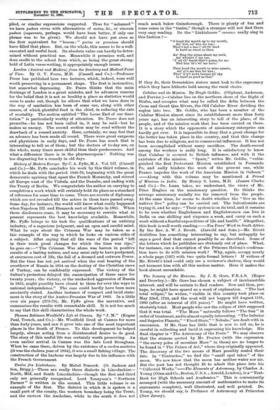History of Modern Europe. By C. A. Fyffe, M.A. Vol.
III. (Cassell and Co.)—Mr. Fyffe concludes his work by this third volume, in which he deals with the period 1848-78, beginning with the great democratic uprising that upset the French Monarchy, and stirred all Europe west of the Vistula, and the Danube, and ending with the Treaty of Berlin. We congratulate the author on carrying to completion a work which will certainly hold its place as a standard of reference for some time to come. There are secrets of diplomacy which are not revealed till the actors in them have passed away.
Some day, for instance, the world will know what really happened when Napoleon III. and Bismarck met at Biarritz in 1865. When these disclosures come, it may be necessary to rewrite what at present represents the best knowledge available. Meanwhile, Mr. Fyffe brings to his task the qualifications of an untiring industry, of a sagacious judgment, and an open and candid mind.
What he says about the Crimean War may be taken as a fair example of the way in which he looks on various sides of a subject. After saying that all the wars of the period "left in their train great changes for which the time was ripe," he goes on :—" The Crimean War alone was barren in positive results of a lasting nature, and may seen only to have postponed, at enormous cost of life, the fall of a doomed and outworn Power. But the time has not yet arrived when the real bearing of the overthrow of Russia in 1854 on the destiny of the Christian races of Turkey, can be confidently expressed. The victory of the Sultan's protectors delayed the emancipation of these races for twenty years ; the victory, or the unchecked aggression of Russia in 1855, might possibly have closed to them for ever the ways to national independence." The case could hardly have been more succinctly stated. Another instance of compact and lucid state- ment is the story of the Austro-Prussian War of 1866. In a little over six pages (373-79), Mr. Fyffe gives the narrative, and summarises the results with remarkable skill. It is not too much to say that this skill characterises the whole work.


















































 Previous page
Previous page